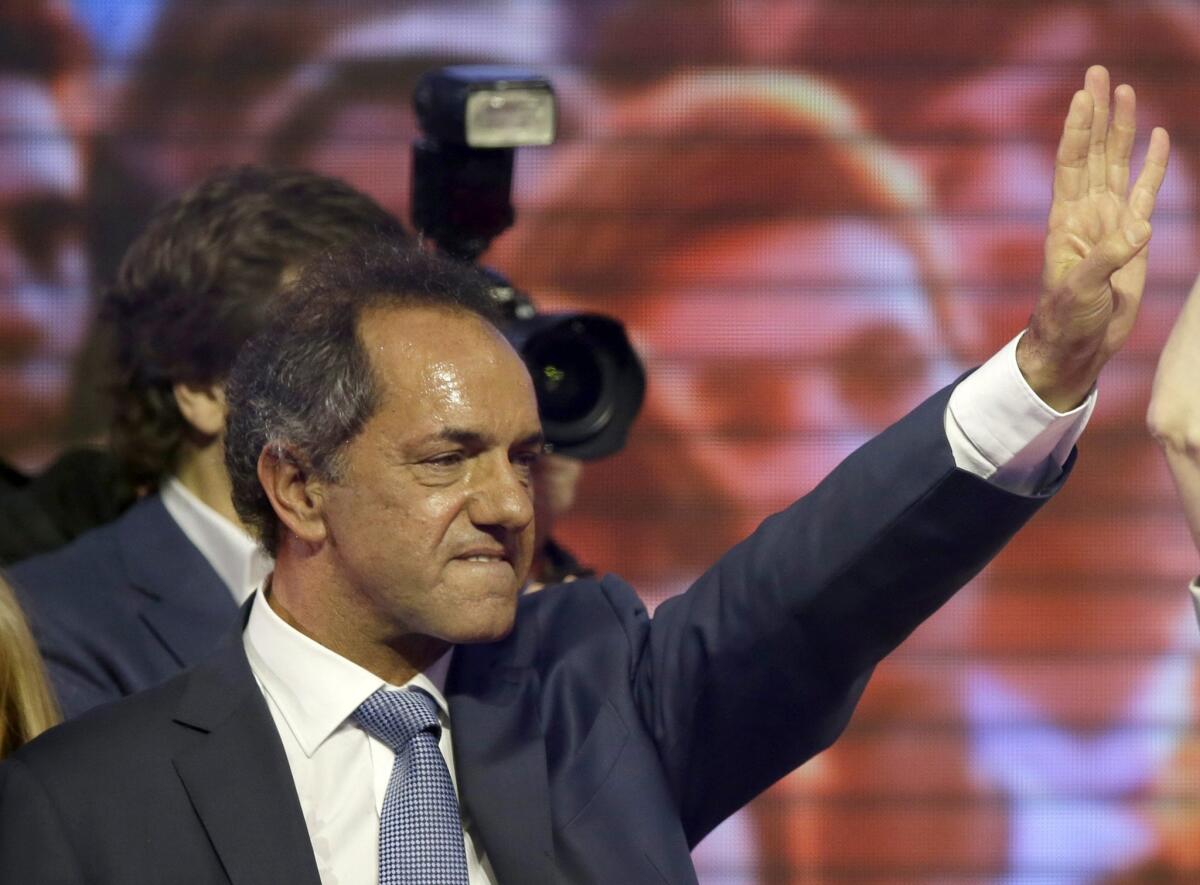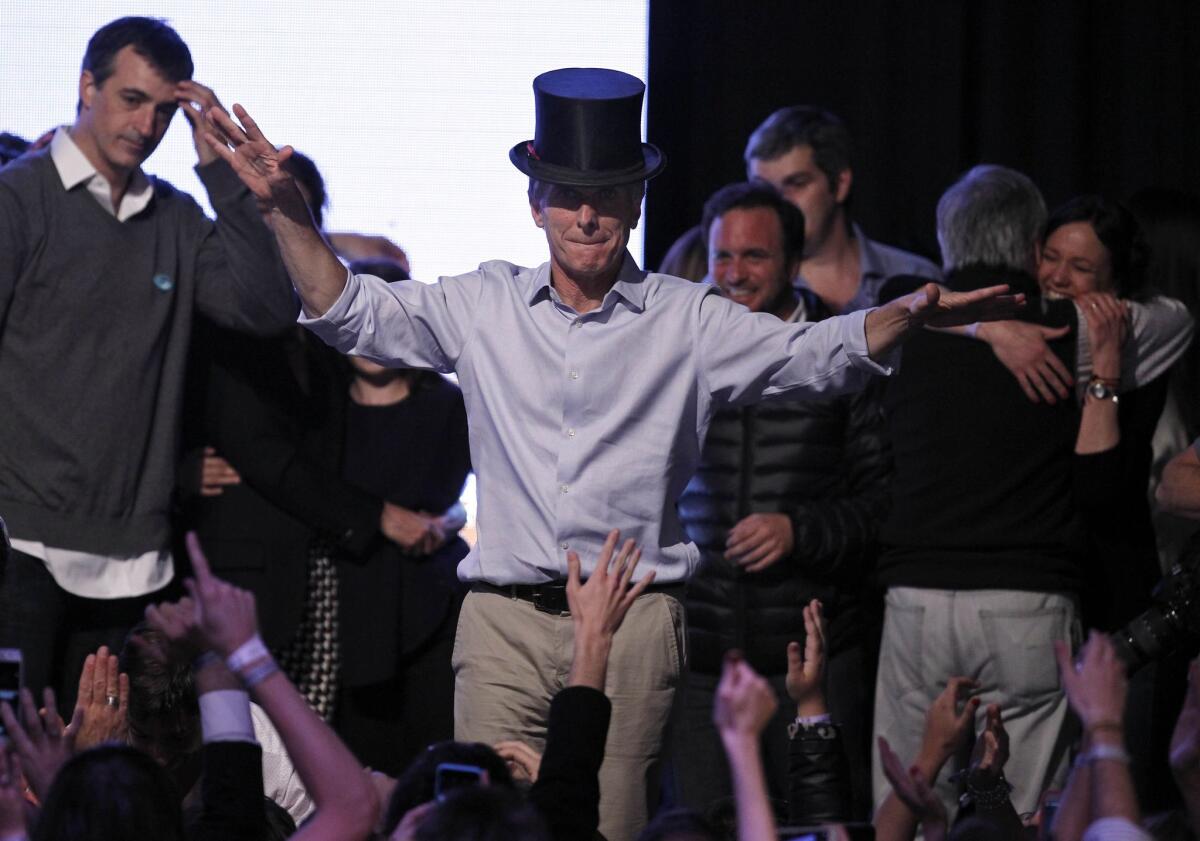Argentina will need a runoff to settle surprisingly close presidential race

Daniel Scioli, the presidential candidate of Argentina’s ruling party, stands on a stage as supporters cheer him on at Luna Park in Buenos Aires on Oct. 25.
- Share via
Reporting from Buenos Aires — In a much closer first round of presidential voting than expected, Buenos Aires Mayor Mauricio Macri did well enough to force a Nov. 22 runoff with first-place finisher Daniel Scioli, the candidate of Argentina’s ruling party.
With nearly all votes counted, Scioli, who is governor of Buenos Aires state and a former vice president, tallied 36.9% of the ballots cast. Macri was close behind with 34.3%.
Scioli, the handpicked choice of outgoing President Cristina Fernandez, needed at least 40% and a 10-percentage-point advantage to avoid a second round of voting.

Argentine presidential candidate Mauricio Macri celebrates at the party’s headquarters in Buenos Aires on Oct. 25.
When it became clear he would not win outright, Scioli emerged from his campaign headquarters in Buenos Aires on Sunday night to ask for independent voters’ support.
Macri was more euphoric: “What happened today has changed the political history of the country.”
The two will face off in the first presidential runoff in Argentinian history. The third-place finisher, congressman Sergio Massa, who garnered 21.3% of votes, could play a kingmaker’s role if he throws his support behind either candidate.
On Sunday, Massa gave no indication which, if either, candidate he would support, saying only that after meeting with his closest advisors, he will release a document in the coming days with his proposals for the next president.
One reflection of the disappointing results for the president was that Anibal Fernandez, her Cabinet chief and handpicked candidate to replace Scioli as Buenos Aires state governor, lost by 5 percentage points to Macri ally Maria Eugenia Vidal.
The loss marks the first election since 1987 that a Peronist -- the name given to followers of the late Argentine president, Juan Peron, and his second wife, Eva Peron -- has not won the governorship of the country’s most populous state.
Argentinians turned out in big numbers -- 79% of the 32 million eligible voters cast ballots -- to decide Sunday’s election. The voting was widely seen as a referendum on the presidencies of Fernandez and her late husband, Nestor Kirchner. Between them, they have led Argentina since 2003.
Although many young and lower-middle-class voters favor the president’s creation of a social safety net and support her human rights record, others expressed dissatisfaction with the current 28% inflation rate and a stagnant economy that last year shrank 2% in terms of the value of total goods and services produced.
Cold but mostly sunny weather nationwide boosted the turnout, election officials said. Many voters cast their ballots early Sunday to return home in time to watch the Argentina national rugby team lose to Australia in the televised semifinals game of the world championship in London.
Scioli, who ran on the Victory Front ticket, promised to continue the president’s social welfare policies with some changes, including a harder line on rising crime. He also called for economic reforms, including the settling of a decade-old bond default.
“I voted for Scioli because I understand he will maintain the project that Nestor and Cristina began,” said 30-year old graphic designer Emilio Ferreyra after voting in the capital. “It’s a way of staving off the right wing.”
After voting in Dique Lujan in Buenos Aires state, Scioli, accompanied by his wife, declined to predict an outcome. “I have done my best like the other candidates and made my best effort,” he said.
The election may mark the end of national power of “Kirchnerismo,” but the family will remain a local force at least. The couple’s son, Maximo, was elected to a national congressional seat for Santa Cruz state, and Nestor Kirchner’s sister, Alicia, was elected Santa Cruz governor.
After voting in the southern city of Rio Gallegos, Fernandez told supporters she would remain a political activist after leaving office. “We kept our promise [and] we are voting in a normal country,” she said.
Though many voters expressed support for Fernandez’s wealth-redistribution programs and prosecution of those implicated in atrocities committed during the 1976-1983 dictatorship, it was clear many were tired of her heavy hand in the nation’s economy.
“I voted for Macri because in the last few years the country hasn’t grown economically or socially,” said Karina Cunibertti, 46, an insurance company employee in Buenos Aires. “Macri represents the possibility of change. I hope he wins the runoff and reestablishes the good functioning of the government and brings about real opportunity for all.”
Special correspondent D’Alessandro reported from Buenos Aires and Kraul from Bogota, Colombia.
ALSO
More than 100 dead as powerful quake rocks Afghanistan, Pakistan, India
How a Bollywood movie helped bring a disabled Indian woman home from Pakistan
5 Britons killed when whale-watching boat with 27 aboard sinks off Canada’s Vancouver Island
More to Read
Sign up for Essential California
The most important California stories and recommendations in your inbox every morning.
You may occasionally receive promotional content from the Los Angeles Times.










